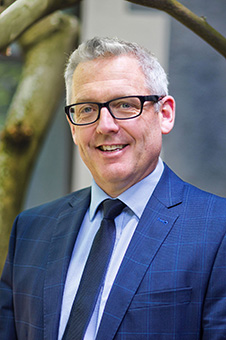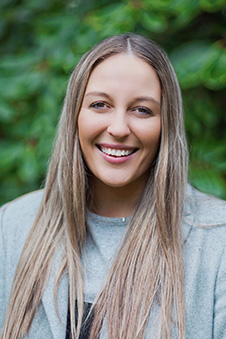The University of Otago's Te Oraka thrift shop and sustainability hub has won the student engagement category at the Australasian Green Gown Awards, which includes entry to the global awards.
The judges say they love this “big-thinking initiative, taking a holistic approach to student engagement, with inclusivity at its core … [and] hope that long-term Te Oraka becomes indispensable to the University”.
The variety of initiatives for students, by students includes a strong focus on social sustainability, a level of cultural respect the judges have not seen before, and a tight focus on investigating how to generate and measure impact.

Ray O'Brien.
Sustainability Office Head Ray O'Brien says the 'living lab' in Dunedin's Anzac Avenue showcases the circular economy by being created from recycled items and pouring all income into its activities, which includes tackling waste minimisation through hosting sustainability events and products.
“We believe our multi-faceted approach, tailored to our needs, is leading by example in New Zealand's tertiary sector and possibly Australia's – and Te Oraka can only grow as more fresh minds join our community,”
He says the prestigious award recognises the enterprising work of Kaitakawaenga/Engagement Team Lead Jes Triscott and the efforts of many students and staff, along with the University of Otago and Property Services Division for providing the space that opened in May.
The benefits
“We have been incredibly surprised … every day the store is open, students are there. We have had incredible turnouts for our events, with our most recent sustainable development Night Market – for students to showcase their businesses – attracting about 250 students,” he says.
Te Oraka also helps the University's Recycling Centre when it gets inundated with dated furniture that is good quality but no longer suitable for the workplace, by selling some of it to staff and students at “very competitive prices”.

Jesikah Triscott.
Regular Bike Grabs – where students pay koha (a donation) to own a bike – raised more than $1,000 for Southern Youth Development (formerly the Malcam Charitable Trust) which reclaims the bikes from landfill then refurbishes them for sale. The trust helps young people make good life choices, set goals, and build their confidence.
Te Oraka has let staff support students in a different way as well, by donating quality goods. And four student groups researched Te Oraka to examine behaviour change and sustainable action.
In general, hosting events has helped strengthen the Sustainability Office's relationships, and three student committees book the space for safe, inclusive events and gatherings as well, something they had limited free access to previously, Triscott says.
Te Oraka is led by the Sustainability Office's five Tētēkura (Student Leads), which it employs part-time.
What else?
Te Oraka has also hosted workshops on making reusable menstrual pads, Tetrapak and electrical recycling, bike repair workshops, and a refill station for hand soap, dishwashing liquid and laundry liquid.
The store stocks local sustainable brands, including Coral Cone menstrual cups supplied at a reduced price to help tackle period poverty, and the student small businesses Swooping Tui homemade skin care and Mimi Collective sustainable candles.
The annual Drop for Good diverted about 85 tonnes of waste from landfill when students dropped off the contents of flats they were vacating in 2021 to be sold to student fitting out their flats the following year, in a joint initiative with the Otago University Students' Association, O'Brien says.
The recent collection saw many staff using the University's new Social Impact Leave to volunteer to sort and stack goods.
Te Oraka also provides skill-building opportunities for University and Otago Polytechnic students when they volunteer to 'work' at the thrift shop.
On the way
The future includes selling portable planter boxes containing vegetable plants at a reduced price, workshops for clothing repairs and alterations, repurposing workshops, queer events, and electrical repair cafés etc.
Why?
Te Oraka – open every Tuesday and Thursday from 11am to 1pm – has shown creating spaces is important for authentically engaging students and staff, simplifying sustainable solutions is essential to spark action, and behaviour changes can be embedded when skills, values, and solutions are accessible and affordable, O'Brien says.
For more information, contact:
Ray O'Brien
Sustainability Office Head
University of Otago
Email ray.obrien@otago.ac.nz
